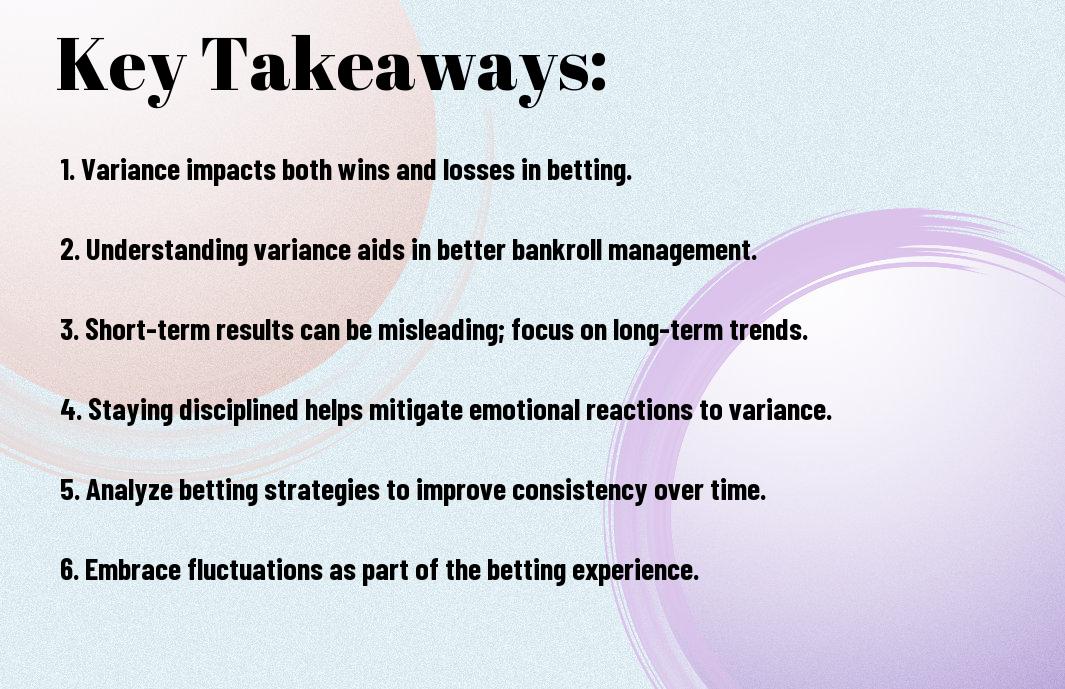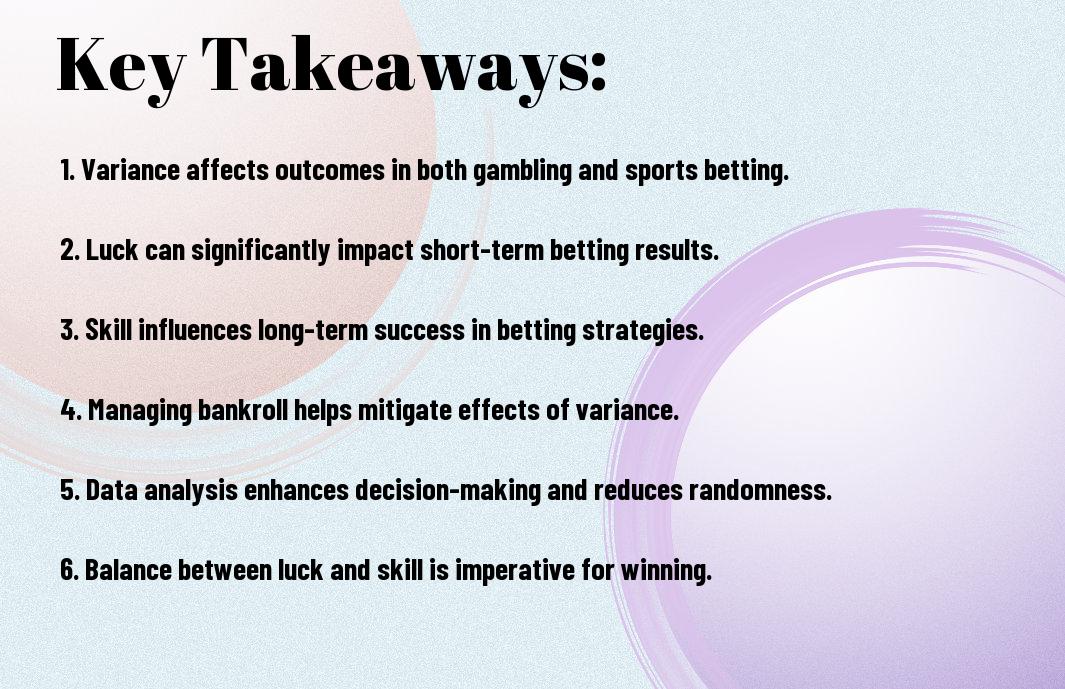As you research into the world of betting, you will inevitably encounter the concept of variance. You may have experienced it firsthand, with your winnings fluctuating wildly from one day to the next. Your bankroll may have taken a hit, leaving you wondering if your strategy is sound. Understanding variance is key to navigating these ups and downs, and making informed decisions about your betting approach. You will learn how to manage your expectations and make the most of your betting experience.
Key Takeaways:
- Understanding variance is necessary for bettors to manage their expectations and emotions, as it explains the fluctuations in winning and losing streaks that are inherent in any form of betting.
- Bettors should focus on making informed decisions based on probability and expected value, rather than being influenced by short-term results that can be misleading due to variance.
- Bankroll management is vital in navigating variance, as it helps bettors to withstand downswings and avoid going broke during periods of bad luck.
- It’s important to distinguish between variance and skill, as a series of wins or losses does not necessarily indicate the presence or absence of betting skill, but rather the natural fluctuations that occur in any random process.
- Developing a long-term perspective and being patient can help bettors to ride out the ups and downs of variance, and ultimately achieve their betting goals by making consistent, informed decisions.

Fundamentals of Variance
The concept of variance is necessary to understanding the unpredictable nature of betting. You will encounter ups and downs, and it’s vital to grasp the underlying principles to make informed decisions. As you navigate the world of betting, you’ll need to consider the statistical aspects that influence your outcomes.
Statistical Nature of Betting
Across various betting platforms, you’ll find that statistics play a significant role in determining your success. You’ll need to analyze data and trends to make informed decisions, taking into account the inherent uncertainty of each bet.
Short-term vs Long-term Fluctuations
Longterm betting strategies often involve riding out fluctuations in your winnings. You’ll experience periods of both profit and loss, and it’s necessary to understand how these fluctuations impact your overall performance. As you develop your betting approach, you’ll need to consider both short-term and long-term perspectives to make the most of your bets.
Indeed, as you investigate deeper into the world of betting, you’ll find that short-term vs long-term fluctuations can significantly impact your overall success. You’ll need to balance your desire for short-term gains with the need for long-term sustainability, taking into account your bankroll, risk tolerance, and betting strategy. By doing so, you’ll be better equipped to navigate the inevitable ups and downs of betting and make the most of your betting experience.
Risk Management Principles
You need to understand the fundamentals of risk management to navigate the ups and downs of betting successfully. This involves setting clear goals, assessing your risk tolerance, and developing strategies to mitigate potential losses.
Bankroll Management
Besides having a solid understanding of the betting market, you must also manage your bankroll effectively to avoid significant losses. This means setting a budget and sticking to it, as well as allocating your funds wisely across different bets.
Stake Sizing Methods
Among the various risk management techniques, stake sizing methods are necessary for maintaining a healthy bankroll. You can choose from different methods, such as flat staking or proportional staking, to determine the optimal amount to wager on each bet.
It is necessary to find a stake sizing method that suits your betting style and risk tolerance, as this will help you to maximize your returns while minimizing your losses. You can experiment with different methods to find the one that works best for you, and adjust your approach as you gain more experience and confidence in your betting decisions.
Psychological Impact
Your betting experience is not just about numbers, but also about how you feel and think, as the psychological impact of variance can be significant, affecting your decisions and overall well-being.
Emotional Response to Swings
Behind every loss or win, there’s an emotional response that can influence your next move, and understanding this is key to navigating the ups and downs of betting effectively, as you need to be aware of how you react to different outcomes.
Maintaining Mental Equilibrium
Beside the thrill of winning, there’s a need to maintain a balanced mindset, especially during losing streaks, to ensure that your betting strategy remains intact and you don’t make impulsive decisions based on emotions rather than logic, which can impact your long-term success.
Psychological resilience is vital in maintaining mental equilibrium, as you will face variance and need to develop strategies to cope with it, such as setting realistic expectations, managing your bankroll, and taking breaks when necessary, all of which can help you stay focused and make better decisions, ultimately enhancing your overall betting experience and performance.
Mathematical Framework
Keep in mind that understanding variance in betting requires a solid mathematical foundation. You’ll need to grasp concepts like probability, statistics, and risk management to make informed decisions. Your ability to navigate the ups and downs of betting depends on it.
Expected Value Calculations
Any aspiring bettor should start by learning expected value calculations. You will use these calculations to determine the potential return on investment for each bet, helping you make smarter decisions and maximize your winnings.
Standard Deviation in Betting
Framework of standard deviation is crucial in betting, as it measures the volatility of your bets. You can use it to assess the risk associated with each wager, allowing you to adjust your strategy accordingly and minimize losses.
Also, as you examine deeper into standard deviation, you’ll discover its significance in evaluating the consistency of your betting performance. You’ll be able to identify trends and patterns, making it easier to refine your approach and achieve your goals. By applying standard deviation to your betting strategy, you’ll gain a competitive edge and make more informed decisions.
Practical Applications
After understanding the concept of variance, you can apply it to your betting strategy by visiting Understanding Variance in Betting: Embracing the Ups and Downs to learn more. This will help you navigate the ups and downs of betting.
Record Keeping
One of the most effective ways to manage variance is by keeping a detailed record of your bets, allowing you to track your progress and make informed decisions.
Pattern Recognition
Below the surface of random chance, patterns can emerge, helping you identify trends and make more accurate predictions, which is vital for your betting strategy.
Hence, as you examine deeper into pattern recognition, you will discover that it involves analyzing data, identifying correlations, and adjusting your strategy accordingly, enabling you to make the most of your bets and minimize losses, ultimately helping you to become a more successful bettor.

Risk Mitigation Strategies
To effectively manage your betting variance, you need to implement strategies that reduce your risk exposure. This involves a combination of techniques that help you navigate the ups and downs of betting, ensuring that your bankroll remains stable.
Diversification Techniques
For instance, spreading your bets across different markets and sports can help minimize your risk. You can also consider diversifying your bet types, such as combining favorites with underdogs, to balance your portfolio.
Stop-Loss Implementation
Against significant losses, you can set a stop-loss limit to cap your potential downside. You can determine a specific amount or percentage of your bankroll that you are willing to lose before closing your position.
Another key aspect of stop-loss implementation is setting realistic targets and adjusting them according to your betting performance. You should regularly review your stop-loss limits to ensure they align with your overall betting strategy and risk tolerance, allowing you to make adjustments as needed to protect your bankroll and maintain a healthy betting habit.
Summing up
Summing up, you now have a better understanding of variance and its impact on your betting experience. You’ve learned to navigate the ups and downs, managing your expectations and bankroll effectively. Your newfound knowledge will help you make informed decisions, minimizing losses and maximizing gains. As you continue to bet, you’ll become more comfortable with the ebbs and flows of variance, ultimately enhancing your overall betting strategy.
FAQ
Q: What is Variance in the context of betting and how does it affect my experience?
A: Variance in betting refers to the fluctuations in results that can occur over a short period of time, leading to both winning and losing streaks. It’s a natural part of the betting process and can significantly impact your emotional and financial state. Understanding variance is key to navigating the ups and downs of betting, as it helps you manage expectations and make informed decisions about your betting strategy. By acknowledging the role of variance, you can develop a more stable approach to betting, focusing on long-term success rather than short-term gains or losses.
Q: How can I manage my bankroll effectively to withstand the variance in betting?
A: Managing your bankroll is necessary to withstanding the variance in betting. This involves setting a budget for your betting activities and sticking to it, ensuring that you only bet what you can afford to lose. It’s also important to diversify your bets and not place too much of your bankroll on a single wager. Additionally, setting stop-loss limits can help you cut your losses during a downswing. By adopting a disciplined approach to bankroll management, you can mitigate the impact of variance and maintain a healthy financial situation, even during periods of bad luck or when your betting strategy is not yielding the expected results.
Q: What strategies can I use to minimize the psychological impact of variance in my betting activities?
A: Minimizing the psychological impact of variance involves developing a mindset that is resilient to the fluctuations inherent in betting. This can be achieved by focusing on the process rather than the outcome of each bet, celebrating small wins, and learning from losses. It’s also beneficial to maintain a betting journal to track your decisions and outcomes, which can help identify patterns and areas for improvement. Furthermore, taking breaks from betting can help you clear your mind and approach your betting strategy with a fresh perspective, reducing the emotional highs and lows associated with winning and losing streaks. By adopting these strategies, you can navigate the ups and downs of betting with a clearer mind and a more stable emotional state.



